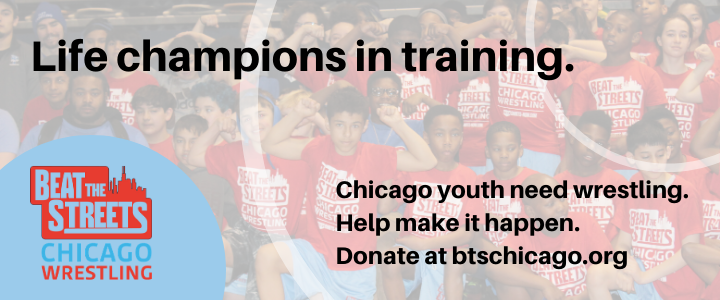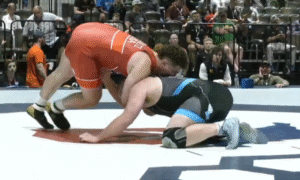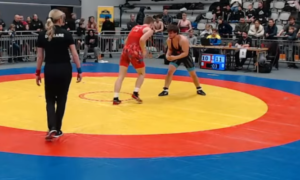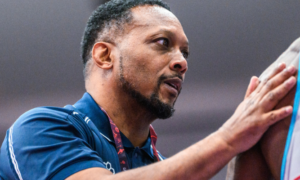In March of 2016, Joe Rau (TMWC/Chicago RTC, world #7) was battling Yasmany Lugo Cabrera (CUB) in the semifinal at the Pan-American Olympic Qualifier in Frisco, Texas when everything went south in a hurry. The bout was scoreless in the first, as Rau, then up at 98 kilograms, committed to a two-on-one on Lugo Cabrera’s right arm. What is normally not a very dangerous tie-up soon spelled disaster. Lugo Cabrera deftly used his freed left arm, and in one motion, wrapped and hipped Rau to his back. Seconds later the match was over, Lugo had qualified 98 for Cuba, and Rau was knee-deep in the throes of devastating disappointment.
It would get worse.
What happened next is common knowledge for Greco hardcores in the United States. Rau won the Olympic Trials in thrilling fashion over Caylor Williams the following month, guaranteeing himself two more opportunities to qualify what had firmly become his weight class. But he lost to Sweden’s Frederik Schoen, a previously vanquished opponent, in the 1st OG World Qualifier in Mongolia; fast-forward a couple of weeks, and Rau was knocked out of the running by Kevin Mejia Castillo (HON) in Istanbul.
These are not to be seen as individual defeats. For Rau, they were elements of a compository failure. A wound that never seemed to quite heal in more ways than one.
Compounding matters, the Chicagoan was forced to reconcile a string of injuries that did little other than to serve as a reminder of his shortcomings. Because, in his mind, it was all traceable. That torn-up knee in ’16 gave way to another tear the next season; and even when healthy in ’18, a dopey injury at the hands of a now-former athlete — though completely unrelated — couldn’t help but drudge up painful memories of obstacles previously thought of as conquered. Rau’s career over the course of this soon-to-be past quadrennium began to take on the appearance of a Sisyphean endeavor in which the hill becomes ever steeper. But inside, he always knew there was a solution, a way to at last heave the rock over the hill.
How It Happened
The 2019 World Championships represented the first shot at Olympic qualification for this season. Rau (who has competed at 87 kg since the ’17 season) went 1-1 in Nur-Sultan, which is to say he came up considerably short of both qualifying or earning a medal. But while a familiar flood of painful feelings once again bubbled to the surface, the hang-time wasn’t as long. Partially due to recognizing the prospect of his competitive mortality, and also due to increasing wisdom pertaining to the patterns of his brainwaves, Rau did not stay down very long. Not even when a shoulder injury endured in the fall scared him out of his wits.
Rau’s objective from here on out is not the slightest bit unique: to win the Olympic Trials, whenever they are, and to win an Olympic gold medal. But there was one other matter of business Rau strongly desired to settle this year, and when he did, four years of anguish promptly disappeared.
Last Friday in Ottawa, Rau had to come from behind in his very first bout to defeat reigning Pan Am Games gold Luis Avendano Rojas (VEN), a bulrush step-out with :34 remaining responsible for the criteria decision. The next match was the all-important semifinal round, where winners secured Olympic berths for their nations in each of the six weight classes. For the second week in a row, Rau outclassed Lesyan Cousin Otomuro (JAM). When that bout reached its conclusion, Rau did not demonstrably celebrate the sensation of ridding his shoulders from carrying an unnecessary burden for an entire quad. The moment to him was bigger than a self-aggrandizing gesture. How else do you expect someone to react once they finally experience relief?
Rau In His Own Words
Rau has appeared on this platform in the form of numerous interviews, Q&A’s, and articles over the past four years. In doing so, he has never shied away from sharing what ’16 meant to him, and how he hoped to have the chance to right what he always felt was a wrong. Now that he has in fact achieved that particular goal — and has already been interviewed other places — here is a mere sampling of his quotes on this outlet that point to just how big of a deal Friday in Ottawa really was.
From: Two of America’s Best Discuss the Reality of High-Level Competition
(November ’16 — Andy Bisek & Joe Rau)
Rau: I won the Olympic Trials, I didn’t qualify for Rio, and I could have easily been like the wrestler we’re talking about. Believe me, I heard the stories. After the qualifiers I wanted to disappear for years and I still do. But I went to Rio and helped you guys train…
Bisek: You understand that it’s bigger than yourself.
Rau: It was bigger than myself and everyone was telling me stuff like, Oh, you’re so lucky, it must be so much fun. It must be an unreal experience.
Bisek: The whole time it’s like torture.
Rau: It was torture for me. I’m over here watching guys who I beat in medal matches at the Olympics. You know, the guy who I lost to trying to qualify at the Pan Ams (Yasmany Lugo Cabrera, Cuba) wound up taking a silver medal. It was so hard for me to stay composed there. And I agree, I think it takes a lot more character to show up the next day and show up again, and show up again, and show up again, and show up again. Maybe I’m a little bit used to that, maybe this other wrestler has more of a history of success.
Bisek: Well I think what this is, is that he feels what people have put on him year after year after year.
Rau: I feel that, too.
Bisek: Oh, so-and-so is on the team, he’s gonna do this and this…
Rau: And I was crazy like that but I feel it, too. It was as if the most pressure I ever felt in my whole life has led up to this moment and I’m trying not to screw it up. And I kind of did. If we’re being honest, I kind of did. And this is something I wanted to ask you tomorrow, but do you have regrets? I hear people always say, Oh, no regrets, all the mistakes I have made led me to this point and if it wasn’t for my mistakes I wouldn’t be here. But you know what? I disagree with that statement and I think it is very cliché because when I think about it, I have so many regrets.
Rau: Going in to qualify for the Olympics I saw that article where you said, “Knowing Joe, he’s going to get it done.”
Bisek: Absolutely.
Rau: And literally, this knee problem kept locking up on me and when I still talk to people today, it sounds like an excuse. I had it in my mind, I’m injured, I’m worried, and there’s a lot of pressure, and as soon as I lose, I know why I lost. And it’s bullshit. It’s bullshit.
Bisek: Because it’s how you’re going to appear to everyone else. How you’re going to come out of this.
Rau: And with it being an Olympic year, all eyes are on you, too.
Bisek: It’s saying, Man, I did this, but I didn’t do that because of this. Had I been 100%, had I been the full “me…”
Rau: It’s something that Momir talks about and that is nobody is 100% ever. You don’t know what is going on.
Bisek: Absolutely.
Rau: You don’t know what is going on. The guy you’re wrestling might have more going on than you. That’s one of my biggest regrets this year that haunts me is I lost to two guys at the last chance qualifiers, both guys who I’ve beat by six points. I beat that Swedish guy (Frederik Schoen) 6-0 in Madrid and he’s a good wrestler. And I beat that Honduras guy (Kevin Mejia Castillo) a couple of months before at the Pan Ams 6-0. It’s like, You’ve got to be kidding me. These are the people in front of me to get to the Olympics.
From: When There Is Laughter: Joe Rau’s Tale of Pain, Perseverance, & Inspiration
(April ’17)
5PM: The fact that you’re coming off this layoff during the heat of the season, Trials approaching and all that, is this happening during a relaxed time in your career, or a pressurized time in your career?
JR: I mean, I feel like the pressure was real for Rio and qualifying for that. There’s still pressure for me to come back and perform, but that’s the pressure I put on myself, really. I don’t feel much outside pressure. I feel pressure from myself mostly. If I’m back and I want to do well… I think that was one of my problems in Hungary, I want to come back with a bang, I want to do really well in this tournament, and I should have just focused on competing again, my positions, my scoring, and instead it’s like, I want to go in there and hit a home run. So if there is any pressure, it’s only the pressure I put on myself. But qualifying for the Olympics and all that, it was almost an insurmountable amount of pressure. And it still haunts me a little bit, that I didn’t come out on top, that I didn’t conquer that pressure, in a way. But I did the best I could given the situation. Right now, I’m putting some pressure on myself, but I wouldn’t say it’s the most pressurized time in my career.
5PM: Despite not qualifying, wasn’t it still a valuable experience? Are you a better wrestler for having gone through that experience, or is that line of thinking presumptuous?
JR: To be quite frank, it’s just a lot of pain. Maybe if I go to Tokyo and win a gold medal I could look at it that way, but right now, it’s just a lot of pain. It is still a long time ago already, it was months ago, but I look back at other things that were similar and it’s, Yeah, it made me stronger, blah, blah, blah, but right now, it’s just very painful for me.
From: Joe Rau Is Inspired Ahead of Season Debut in Italy
(January ’20)
5PM: You were originally coming back for New York and then you got injured, forcing you have to wait until Rome to compete again. The injury is a negative, but what has been the most positive thing about having to wait until January to compete?
Joe Rau: Hurting my shoulder was a very negative thing at first. And I’d be lying if I said I took it well. When I hurt it, I knew it was torn right away, but I didn’t know what that meant as far as surgery and wait time, not until a month after it happened. When I first hurt it, I was pretty dramatic. It was like my career flashed before my eyes. And again, I was all alone. Just like my knee, like my jaw. I was hurt. I was thinking at the time that I might be done for the year and it made me feel so out of control as to whether or not my goals could become a reality.
You are well aware of what happened to me in 2016. Not qualifying the weight was a tragic end to a very good year. I tore my knee winning (Olympic) Trials and I want to take full responsibility for not qualifying the weight; but I also want to acknowledge I wasn’t at my best for the two Last Chance Qualifiers. That’s a wrong in my career and life that I have been wanting to correct since 2016. When I tore this shoulder, I thought I might not get that chance.
When I first tore my shoulder, it put me in a deep depression momentarily and I was feeling sorry for myself. I thought that it might be all over for me. But after coming out of that emotional pit and getting back on the mats, it has been the best feeling of my career. It’s not over. Qualifying the weight is still in my hands. And I have the opportunity to put in the work, use my experience, and accomplish my dream of becoming an Olympian. I have also hit a new spot in my life where I don’t need it to happen, which I think is powerful. But dammit, I want it as bad as you can imagine.
Listen to “5PM34: Terrence Zaleski” on Spreaker.
SUBSCRIBE TO THE FIVE POINT MOVE PODCAST
iTunes | Stitcher | Spreaker | Google Play Music





















